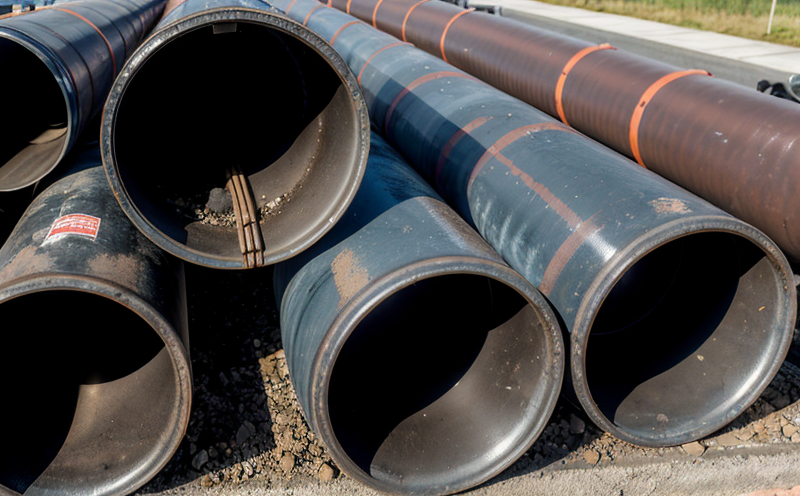BS EN ISO 13968 Chemical Resistance Testing of Plastic Pipes
The BS EN ISO 13968 standard outlines a procedure for determining the resistance of plastic pipes to chemical attack. This testing is crucial in ensuring that materials used within various industries, particularly those involving corrosive chemicals or fluids, remain stable and functional over their intended lifespan.
Chemical resistance tests are typically required when selecting pipe materials for applications such as wastewater management systems, chemical processing plants, and plumbing. The test results provide a quantitative measure of the material's ability to withstand exposure to specific chemicals without degradation. This is important not only for the integrity of the piping system but also for worker safety and environmental protection.
The testing process involves subjecting prepared specimens to various chemicals under controlled conditions. The specimens are then evaluated based on defined criteria to determine their resistance level. The results help manufacturers, engineers, and quality control personnel make informed decisions regarding material selection and product design.
Understanding the chemical resistance of plastic pipes is essential for several reasons:
- To ensure compliance with relevant regulations and industry standards
- To prevent potential failures that could lead to costly repairs or replacements
- To enhance worker safety by minimizing exposure to hazardous chemicals
- To reduce environmental impact through the use of durable, sustainable materials
The BS EN ISO 13968 method is widely recognized for its accuracy and reliability. It provides a standardized approach that ensures consistent results across different laboratories and testing facilities.
For quality managers, compliance officers, R&D engineers, and procurement professionals, the ability to perform this test in-house or through an accredited laboratory can significantly enhance decision-making processes. By understanding the chemical resistance of plastic pipes, these stakeholders can optimize product performance, reduce maintenance costs, and ensure regulatory compliance.
Scope and Methodology
| Test Parameters | Description |
|---|---|
| Chemical Exposure | The test involves exposing plastic pipe specimens to specific chemicals under controlled conditions. |
| Temperature and Duration | The exposure period and temperature are carefully selected based on the intended application of the pipes. |
| Type of Chemicals | A range of chemicals relevant to the industry or application is used for testing. |
| Acceptance Criteria | Description |
|---|---|
| Evaluation Metrics | Changes in physical properties, appearance, and mechanical strength are assessed. |
| Data Interpretation | Results are compared against the baseline to determine compliance with the standard. |
The testing process begins by selecting appropriate specimens of plastic pipes that represent the material being evaluated. These samples undergo preliminary conditioning, such as soaking in a neutral solution and drying, before exposure to various chemicals at specified temperatures for defined durations. The changes observed in physical properties, appearance, and mechanical strength are meticulously recorded.
After the test period, the specimens are examined according to predefined acceptance criteria. If the material meets these criteria, it is considered chemically resistant within the scope of the test. Compliance with BS EN ISO 13968 ensures that the pipes can be used in applications where chemical resistance is critical.
Eurolab Advantages
At Eurolab, we offer comprehensive plastic pipe testing services tailored to meet your specific needs. Our highly experienced team of professionals uses state-of-the-art equipment and follows strict protocols to ensure accurate and reliable results.
- Accreditation: Our laboratory is accredited to perform BS EN ISO 13968 tests, providing confidence in the validity of our results.
- Expertise: With years of experience in polymer & plastics testing, we have the knowledge and skill to handle even the most challenging samples.
- Technology: Our laboratory is equipped with advanced instruments for precise measurement and analysis.
- Compliance: We ensure that all tests are conducted according to international standards, including BS EN ISO 13968.
- Support: Our team provides expert advice on material selection and formulation based on test results.
In addition to our testing services, Eurolab also offers a range of other polymer & plastics testing services. From material characterization to biodegradability testing, we have the expertise to support your quality assurance and product development processes.
Environmental and Sustainability Contributions
- Eco-friendly Materials: By selecting chemically resistant pipes that meet BS EN ISO 13968 standards, industries can minimize the risk of leaks and spills, reducing environmental contamination.
- Longevity: Chemically resistant pipes last longer, requiring fewer replacements and less maintenance over time. This reduces waste generation and resource consumption.
- Worker Safety: Chemical resistance helps protect workers from exposure to hazardous substances, contributing to a safer work environment.
- Energy Efficiency: The use of durable pipes can lead to more efficient systems, reducing energy losses in processes that rely on chemical handling.
The BS EN ISO 13968 test ensures that plastic pipes meet the highest standards for chemical resistance. By incorporating these materials into industrial and commercial applications, we contribute positively to sustainability goals and worker safety.





